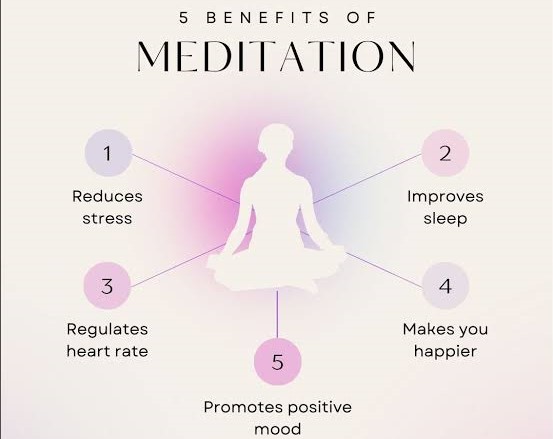Introduction
Meditation has been shown to have significant effects on the brain, and its impact is often discussed in terms of neuroplasticity (the brain’s ability to reorganize itself) and the modulation of neural activity. Here are some points of the neuroscience behind meditation:
1. Brain Areas Involved
Prefrontal Cortex (PFC): Meditation has been shown to increase activity in the PFC, which is involved in higher cognitive functions such as attention, decision-making, and self-regulation. Long-term meditation practitioners often have greater gray matter density in this area, which may contribute to improved emotional regulation and executive function.
Insula: The insula, involved in interoception (the perception of internal bodily states), is also activated during meditation, especially in practices that focus on bodily sensations. This may be linked to greater self-awareness and mindfulness.
Amygdala: This region, responsible for processing emotions like fear and stress, tends to show reduced activity during meditation. Regular meditation practice may reduce the emotional reactivity associated with stress, anxiety, and fear.
2. Neuroplasticity
Studies suggest that meditation can promote structural changes in the brain, particularly in areas involved in attention, emotional regulation, and self-awareness. For example, regular meditation has been associated with increased gray matter density in the hippocampus (involved in memory) and in the PFC. The process of neuroplasticity during meditation may be linked to improved mental health, as it allows the brain to reorganize itself in response to new patterns of thought and behavior.
3. Neurotransmitters
Meditation influences several neurotransmitters and hormones that play roles in mood regulation. For example, serotonin levels may increase, contributing to feelings of well-being and reduced anxiety.
Dopamine is linked to reward and motivation. Meditation can increase dopamine production, which might explain the sense of contentment and calm often reported by mediators. Gamma-Aminobutyric Acid (GABA): Meditation has been shown to increase GABA activity, which has a calming effect on the brain and may help reduce anxiety.
4. Alpha and Theta Brain Waves
Meditation, particularly deep forms like transcendental meditation, can increase alpha and theta brain wave activity. Alpha waves are associated with relaxed, yet alert states, and theta waves are linked to deep relaxation and creative states. Increased alpha and theta activity during meditation has been linked to improved emotional regulation, relaxation, and enhanced cognitive functioning.
5. Stress Reduction
One of the most well-known benefits of meditation is its ability to reduce stress. This is partly due to the reduction in amygdala activity and the lowering of cortisol levels, the hormone most commonly associated with stress. Meditation has also been shown to enhance the parasympathetic nervous system (the “rest and digest” system), promoting a state of calm and reducing the effects of chronic stress on the body and brain.
6. Improved Attention and Focus
Meditation, particularly mindfulness and concentration-based practices, can improve attention and focus. Studies have shown that regularly meditating shows improved performance in tasks requiring sustained attention and reduced susceptibility to distractions.
7. Mindfulness and Emotional Regulation
Mindfulness meditation, which involves non-judgmental awareness of the present moment, can lead to greater emotional regulation. It helps practitioners become more aware of their emotions without being overwhelmed by them, potentially leading to more adaptive responses to emotional stimuli. Over time, mindfulness meditation can help “rewire” the brain to respond to stressors and emotional challenges in a more measured, less reactive way.
Why Do People Practice Mindfulness Meditation?
Mindfulness meditation, a practice with roots deeply embedded in historical and cultural contexts, emphasizes being present and fully engaging with your lived experience. Mindfulness meditation has not only survived centuries but has changed and been changed by a variety of cultural contexts in both the East and West over the last 2,500 years
People are drawn to a mindfulness practice for its cognitive and emotional benefits, fostering a sense of peace, focus, and resilience. Practitioners start meditating for all kinds of reasons, including reducing stress, improving emotional health, enhancing self-awareness, and supporting overall well-being. Often, people come to meditation for the first time because their existing coping mechanisms for dealing with life’s ups and downs are no longer working.
And of course, many people meditate for spiritual reasons. Meditation is a central component of Buddhism and an important part of many religions, including Hinduism, Taoism, Islam, Christianity, Judaism, Sikhism, Jainism, and the Baha’i faith.
What Happens Scientifically When You Meditate?
The benefits of meditation, long reported through personal accounts, have been confirmed by science. Indeed, the neuroscience of meditation is now fairly well explored.
What happens in your brain activity when you meditate? You’re actually physically changing your mind. Neurological studies utilizing brain scans reveal significant changes during meditation, such as increased activity in areas related to attention, compassion, and calmness.
Meditation impacts the autonomic nervous system, promoting a state of relaxation and stress reduction. In fact, meditation affects two different stress pathways in the brain, activating regions associated with attention and emotional regulation.
Furthermore, meditation can trigger endorphin release, contributing to an enhanced sense of well-being. Specifically, brain scans during meditation show increased connectivity and activity in regions associated with positive emotions and self-regulation.
What Are the Health Benefits of Meditation and Mindfulness?
Neuroplasticity: Meditation has been shown to enhance neuroplasticity, the brain’s ability to form new connections and pathways. This adaptability plays a crucial role in learning and memory, allowing individuals to respond more effectively to new situations and challenges.
Sharpens Attention: Regular meditation practice improves focus and concentration, enabling practitioners to stay engaged in tasks for longer periods without succumbing to distractions. According to a study from the journal Frontiers in Human Neuroscience, mindfulness meditation improves executive attention even for novice meditators.
Improves Resiliency to Stress: Meditation strengthens the mind’s resilience to stress by reducing reactivity to stressful situations, fostering a more balanced and calm response to life’s challenges.
Meditation can also reduce cortisol levels in the body. Excess cortisol can lead to high blood pressure, weight gain, and changes in mood.
Age-related Memory Loss: Studies have linked meditation to a slower rate of cognitive decline, suggesting it can be beneficial in maintaining memory and mental clarity as one age.

Mindfulness-based stress reduction (MBSR) training was proven to sustain and even enhance working memory capacity, even in high-stress situations.
Better Physical Health by Maintaining a Healthy Blood Pressure. By promoting relaxation and reducing stress, meditation can contribute to healthier blood pressure levels, benefiting cardiovascular health.
Can Help with Substance Abuse and Impulsive Eating: Meditation aids in developing self-control and awareness, which can be instrumental in addressing behaviors like substance abuse and impulsive eating.
Dr. Judson Brewer teaches a course on mindful eating in the Happier app. A psychiatrist and internationally known expert in clinical mindfulness training, Dr. Brewer has developed and tested novel mindfulness programs for addictions, including smoking cessation and overeating. He has also studied the neural mechanisms of mindfulness using standard and real-time fMRI and is translating these findings into clinical use.
Also Read: Exploring 7 Chakras Understanding Your Energy Centre

